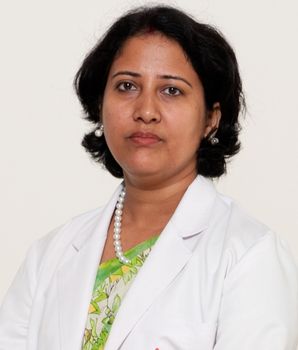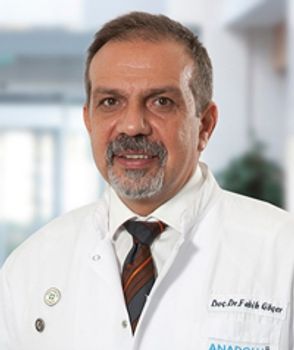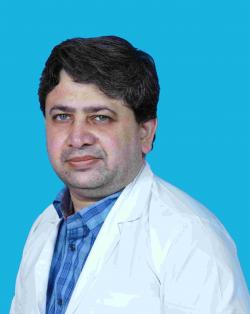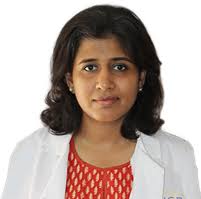Breast Cancer in Men
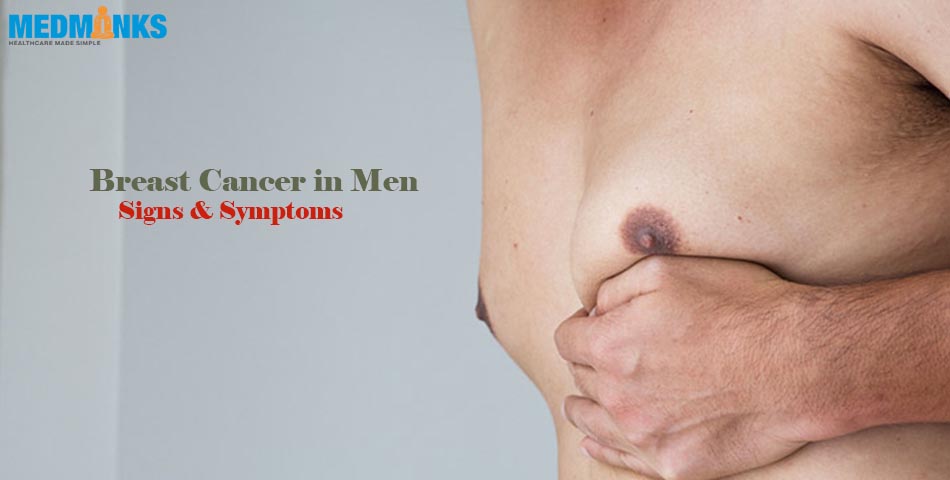
Breast Cancer, Now a Man’s Illness too?
It came as a shock to men when they learnt about this illness which they never thought could occur in them. Very little is known as to how this condition develops and plaques men but now that we know it exists; it becomes inevitable for men to undergo screenings.
Pertaining to the fact that breast cancer is the second-most diagnosed cancer amongst women, but it is least-diagnosed cancer in men. Breast cancer in males diagnosed at an early stage can be cured. As per estimates of American Cancer Society, close to 2,550 men in the United States will be diagnosed with breast cancer and 480 are likely to die due to the aggressiveness of cancer.
Male breast cancer is an extremely rare type of cancer that originates in the breast tissue of men. Till now breast cancer has been associated with woman's disease, whereas breast cancer in men seems newest in the block and usually older men are at an elevated risk of developing the risk. However, it may occur at any age.
Signs & Symptoms
Some of the signs and symptoms of breast cancer in men are as follows:
• Lumping of the breast tissue
• Dimpling of the skin around the breast
• Puckered breast skin
• Changes in nipple such as redness or scaling, or when the nipple begins to turn inward
• Blood or opaque discharge from the nipple
Risk Factors & Causes
Some of the factors that up the risk of breast cancer in men are as follows:
• Older age- Risk of breast cancer in men increases with age, mostly occurring among men of age bracket 68 and 71.
• Exposure to oestrogen- Exposure to oestrogen-related drugs while undergoing a sex-change procedure or hormone therapy for prostate cancer has been associated with elevating the risk of breast cancer in men.
• Inherited Gene Mutations- Mutations in BRCA2 gene may up the risk of breast cancer in men.
• If breast cancer risk runs in the family- If any of your family members is diagnosed with breast cancer then the risk in others also increases.
• Klinefelter's syndrome- Klinefelter's syndrome is a genetic condition which occurs when a baby boy has more than one copy of the X chromosome. The condition has been linked to the abnormal development of the testicles. Men who are afflicted with this syndrome produce more levels of estrogens when compared to androgens.
• Liver disease- Liver cirrhosis is a condition in which male hormones and increase female hormones, increasing your risk of breast cancer.
• Obesity- Adipocytes, also known as lipocytes cells play a vital role in transforming androgens into estrogen, and excessive fat in the body increases estrogen level, thereby increasing odds of breast cancer.
• Radiation exposure- Exposure to radiations while undergoing cancer treatment may put one at greater odds of breast cancer.
• Testicle disease or surgery- Inflammation in the testicles (orchitis) or undergoing surgical removal of a testicle, which is known as orchiectomy has been linked to increased risk of breast cancer.
• Occupations: It has been found out that men who work in extremely hot environments such as steel mills are at an elevated risk of developing the disease because prolonged exposure to high temperatures negatively impacts the testicles, thereby disrupting the hormone levels. Heavy exposure to gasoline fumes is also linked with increasing the risk.
Diagnosis
The various tests one may undergo for diagnosis of breast cancer are as follows:
• Clinical breast exam- This is a simple breast examination which assesses the surrounding areas for lumps or other changes in or around the breast. Further assessment involves determining the size of the lumps and how they appear and affect one’s breast skin and tissue.
• Imaging tests- Undergoing mammogram and ultrasound holds potential in detecting suspicious masses in the breast tissue.
• Biopsy- This procedure which involves inserting a needle into the breast and then the tissue is sent to the lab for evaluation.
Stages
It is very important to determine the stage of cancer so that the treatment options can be ruled out accordingly.
Stage I- A benign tumour which has not metastasized to the nearby lymph nodes and is not more than 2 centimetres in diameter.
Stage II- The size of the tumour is about 5 centimetres and has spread to the adjacent lymph nodes. The size of a tumour sometimes exceeds 5 cm.
Stage III- In this stage, the tumour becomes larger than 5 cm and may affect adjacent lymph nodes.
Stage IV- This is the most aggressive stage of cancer when cancer spreads to other parts of bodies such as bone, liver, brain or lungs.
Treatment
The type of treatment one undergoes is dependent on the overall health of the patient, type, grade and severity of cancer. The various treatment options for breast cancer in males are as follows:
• Surgery
This procedure involves surgically removing the tumour along with the breast tissue and adjacent lymph nodes, which is termed as modified radical mastectomy. The breast tissue, along with the nipple and areola, and some underarm lymph nodes are removed.
One of the lymph node is removed for testing, known as sentinel lymph node biopsy. The lymph node is then sent to the laboratory for diagnosis.
• Radiation therapy
Radiation therapy involves exposing the patient to high-energy radiations so that cancer pathogens can be demolished. For treating breast cancer in male, radiation therapy may be given post surgery so that the remaining cancer cells in the armpit or chest could be killed.
• Chemotherapy
Chemotherapy involves administering anti-cancer agents either intravenously or orally so that the pathogens can be destroyed. Chemotherapy is usually given post surgery so cancerous pathogens that had spread to other parts of the body can be destroyed. Chemotherapy is often used for treating advanced breast cancer in men.
• Hormone therapy
Some breast cancers in men are hormone-sensitive; in that case hormone therapy is advised. The procedure administers the same medication which is used for treating breast cancer in women.
Best Oncologist and Hospitals for Breast Cancer
• Max Super Speciality Hospital, Saket- Dr Harit Chaturvedi
• Medanta- The Medicity, Delhi NCR- Dr Rajeev Agarwal
• Fortis Memorial Research Institute(FMRI), Delhi NCR- Dr Vinod Raina
• Fortis Memorial Research Institute(FMRI), Delhi NCR - Dr Rahul Bhargava
• Max Smart Super Speciality Hospital, Saket - Dr Rahul Naithani
• BLK Super Speciality Hospital, New Delhi- Dr Amit Agarwal
• BLK Super Speciality Hospital, New Delhi- Dr Dharma Choudhary
Cost of Breast Cancer Treatment in India
Breast cancer treatment cost in India is less when we compare it to other countries. The cost of breast cancer surgery is starts from USD 2,200. Radiation therapy costs starts from USD 3500 (IMRT) and the cost of chemotherapy per cycle is USD 500. However, the type of treatment one undergoes depends on the extent, type and severity of cancer.
With male breast cancer on the surge, raising awareness about the same and encouraging men to undergo screenings and seeking professional advice is the need of the hour so that if at all breast cancer gene persists in any men, it is diagnosed before it advances. Further research has been warranted in improvising the screening and treatment of breast cancer which would open avenues for efficiently managing the disease. Also, men are excluded from breast cancer clinical trials since presently all drug or treatment trials has witnessed the participation of only female participants.
Healthcare services in India have enhanced, and have become more organised as various healthcare platforms have emerged which provide both Indian and international patients cost-effective and quality treatment in India. One of such platform is MedMonks, which has tie-ups with leading hospitals in India and proficient surgeons. They not only connect patients to the right hospital and right doctor but are there with them throughout their treatment.

